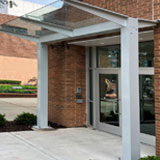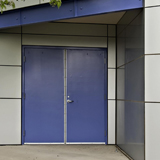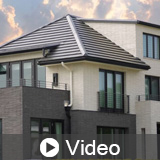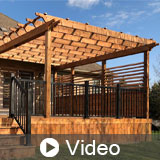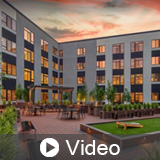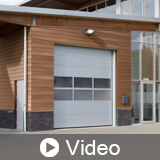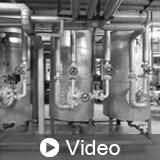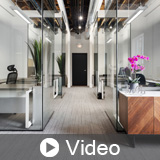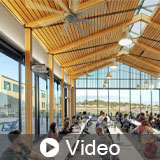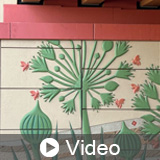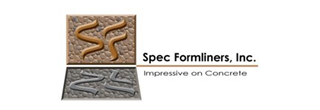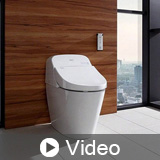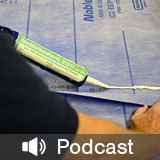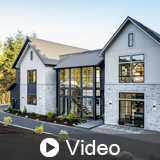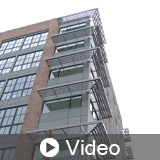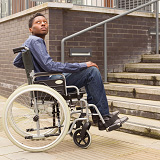This course covers the production and recyclability of steel in the construction industry, including the general and sustainable advantages of building with steel. This includes a look at how specifying steel can contribute to potential LEED credits as well as compliance with standards such as the International Green Con...
Ontario Association of Architects
2 Upcoming Webinars
|
Thu Mar 5 - 12:00 pm EST
|
|
Wed Apr 15 - 12:00 pm EDT
|
150 Online Courses
Free Course
|
|
In this one hour course, we will take an in-depth look at the sustainability and energy efficient attributes of concrete tile roofing, including the near zero-waste manufacturing process, life cycle cost and performance versus temporary asphalt shingle roofing as well as the installation processes which enhances the inhe...
|
|
Imagine you're designing a multi-story residential complex in a densely populated urban area. Suddenly, a fire breaks out on one floor, rapidly engulfing the structure. Now, consider this: What if you had the power to significantly reduce the spread of flames and give occupants more time to evacuate safely? How would you...
|
|
During the Industrial Revolution, engineers looked for ways to create materials that were strong, waterproof, and long-lasting. New advances in technology led to the creation of beautiful, better-performing, longer-lasting, and sustainable materials for a wide use of applications. In this course, we compare tradi...
|
|
We explore the critical aspects of moisture management in building design, focusing on the implementation of effective rainscreen wall systems and composite cladding. Participants will learn to identify potential moisture-related issues that can impact aesthetics, structural integrity, and occupant health. The course exp...
|
|
A variety of commercial and industrial applications, from warehouses to schools, rely on Emergency Eyewash & Shower Equipment to protect occupants from chemicals, irritants, and other biohazards with which they might come in contact in their workplace. Join us in this one-hour course as we discuss ANSI Z358.1 complia...
|
|
Bluetooth operable, modular construction without compromising the demand for reliable, continuous hot water. Join us for this one-hour course as we explore electric tankless water heaters engineered for commercial applications. In this course, participants will dive into the newest technologies of hot water production t...
|
|
Designing public handwashing solutions that are code compliant, that are reliable as well as water and energy efficient, can present several challenges to both the architect and plumbing engineer. Join us in this one-hour course as we discuss current plumbing codes, public health agency guidelines, and regulatory statute...
|
|
This one-hour course delves into the advanced properties and benefits of Silane Modified Polymer (SMP) for architects and building professionals. Participants will explore SMP’s unique adaptability and bonding strength, which supports high-performance applications across varied climates and building types. The course exa...
|
|
This podcast course provides a comprehensive exploration of sustainable design and carbon management in the built environment. Participants will learn to differentiate between operational and embodied carbon, utilizing various tools and metrics for carbon design measures. A key focus will be discussing how Environmental...
|
|
Overlooking the smallest detail in HVAC systems design can cause huge issues later. Join us in this one-hour course as we discuss HVAC systems as it relates to thermal comfort, the ever evolving changes to energy requirements that impact HVAC systems and the factors that impact durability, sustainability and longevity. P...
|
|
In this course, we explore how HVLS Fans can contribute to thermal comfort, energy savings, and sustainable design. Our team explores the basics of ASHRAE Standard 55 requirements and new updates to Standard 55-2017 & 55-2020. We discuss how air movement can assist with meeting indoor air quality performance and ener...
|
|
Thin stone veneers are revolutionizing architectural design by offering lightweight, flexible, and sustainable alternatives to traditional stone applications. We will take an in-depth look at ultra-thin stone veneer technology, its composition, manufacturing process, performance benefits, and broad range of applications....
|
|
Enriching community spaces with architectural art in everyday places. Join us for this one-hour course on architectural plastic, semi-elastomeric, and urethane form liners. Taking traditionally flat, uninspired structural spaces, form liners bring immense value through cultural, historical and naturescape art possibiliti...
|
|
In this one hour video presentation, we explore how sustainable manufacturing helps reduce environmental impacts and solve critical issues facing our planet. Our team discusses how a manufacturer can use innovative practices to reduce energy and water consumption and material waste. Industry experts describe why design p...
|
|
This course examines the occupant wellness and sustainability implications of waterproofing systems in Division 9 wet zone applications. Participants will explore design considerations, material selection, specification language, and installation methods that directly affect occupant safety, building durability, and envi...
|
|
Constructing building envelopes designed to withstand extreme weather events and the impact of drastic temperature swings, join us for this one-hour course on building with fiber cement cladding. Participants will examine the importance of building sustainably with fiber cement cladding designed for resiliency to ensure...
|
|
This course discusses the impact of buildings on the natural environment and offers insight on designing to minimize those impacts through sun control and mastery of the elements. The discussion emphasizes implementing design methods including specification of technologies such as sunshade and daylighting canopy systems,...
|
Premium Course
|
On September 15, 2010, the Department of Justice published updated Title II and III ADA regulations and adopted the 2010 ADA Standards for Accessible Design. This one hour session will address substantive changes to the regulations and design criteria which became effective on March 15, 2011 and are enforceable as of Mar...
|
|
Are you tired of sustainability webinars and workshops that ignore the elephant in the room? This course confronts environmental reality without corporate greenwashing or cheerful platitudes. We examine climate change, mass extinction, toxic building materials, and institutional failure through the lens of philosophical...
|

_0.jpg)
